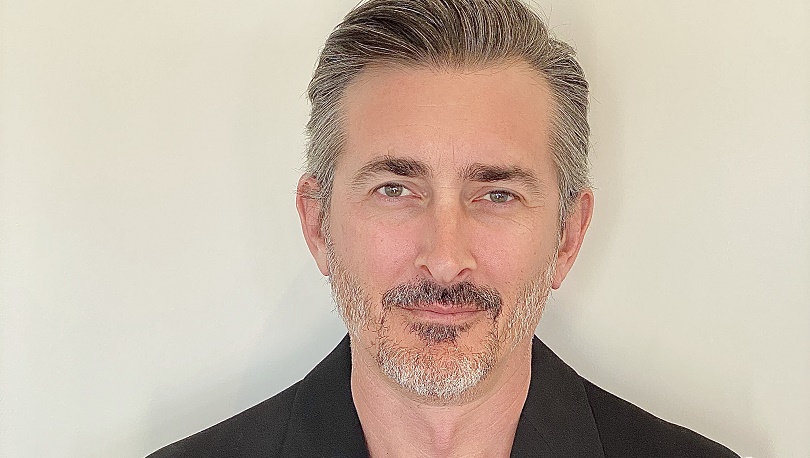Richard rallies the troops: How Morrison’s co-founder is saving fashion

Richard Poulson’s life doesn’t look anything like it did six weeks ago.
Like many business owners, the co-founder of Fremantle-based designer fashion label Morrison was forced to put his plans for the year on hold after COVID-19 struck, bringing bricks-and-mortar sales to a shuddering halt.
Poulson and fellow Morrison co-founder Kylie Radford temporarily closed their stores and stood down 75 per cent of their staff to keep the business going during the worst of the crisis.
But that’s not why life looks so different for the acclaimed Western Australian designer. Because, on top of all this, Poulson has become the de facto leader of a growing group of fashion players who are crowdsourcing survival strategies and offering support to one another on weekly Zoom calls.
Poulson started the calls in early March, and, initially, there were just four or five people dialling into the virtual ‘war room’. But word spread as the crisis deepened, and today there are over 200 participants, including industry veterans, such as Carla Zampatti, as well as emerging designers managing every part of the business themselves.
“I think the key takeaway is that it provides business owners with confidence in their decision-making process,” Poulson tells Inside Retail Weekly.
“We’ve created checklists of things you need to do in your business so that you can remain sustainable.”
Adore Beauty CEO Kate Morris started a similar initiative for online retailers after she realised they were all in the same boat when the pandemic hit. Why should every business spend precious time and resources coming up with a new office hygiene policy if they could borrow and adapt someone else’s?
But as the situation has evolved, the conversation in Poulson’s war room has shifted from figuring out how to keep the lights on for one more day, to understanding what’s needed to survive in the ‘new normal’ over the coming months.
Poulson has started inviting big names from the global fashion industry to dial in and offer advice. Recent guest speakers include Simon Lock, founder of Mercedes-Benz Fashion Week Australia, Godfrey Deeny, international fashion critic, and Dan Thawley, a consultant who has worked with Gucci and other luxury brands. Next week’s call will feature Imran Amed, the founder and editor-in-chief of Business of Fashion.
Most Australian designers wouldn’t have the opportunity to meet, let alone grill, these experts in real life – Lock, Deeny and Amed are all based overseas – which highlights one of the silver linings of isolife.
“People are more accessible,” Poulson says.
Think global, act local
It was on one of the early Zoom calls, when designers were losing huge wholesale orders overnight and closing stores to preserve cash, that Poulson had the idea to start a campaign to support local fashion brands.
Backed by the Australian Fashion Council, the We Wear Australian campaign saw more than 140 designers offer discounts on new season merchandise online and donate cash or clothing to non-profit organisations Dress for Success or Thread Together with every purchase.
Running from April 9-30, the campaign generated roughly $3 million in sales for participating brands and dressed tens of thousands of people in need. One of the brands that saw a significant sales bump from the campaign was Nobody Denim.
“Over the past few weeks, we’ve seen an uplift in both traffic and sales, with 22 per cent of our referrals during the month of April coming directly from the We Wear Australian landing page,” John Condilis, Nobody Denim’s managing director, tells IRW.
Condilis believes consumers became more receptive to the ‘buy local’ message during the pandemic and says the campaign tapped into that feeling.
“I think customers are definitely more interested in buying Australian brands right now, in supporting local businesses and keeping dollars in our own backyard,” he says.
“The global situation has impacted many industries and with supply chains being thrown into disarray, sometimes without warning, customers are increasingly realising the need to be more self-sufficient as a country and to support those that will support the community in times of need.”
A recent survey from Accenture backs this up, with 45 per cent of respondents saying they’re making more sustainable shopping choices during the shutdown and will likely continue to do so after it’s over.
That bodes well for the next stage of the We Wear Australian campaign, which kicked off on Tuesday, May 12. This time, fintech company Klarna is incentivising shoppers to buy local by offering the chance to win one of 75 $1000 vouchers that can later be spent with the participating brands.
For Poulson, though, the success of the campaign has come at a cost.
“I don’t think I’ve ever been as busy as I have been in the last six weeks,” he says.
“Trying to get my own work done has been almost impossible. I’ve put everything into the We Wear Australian campaign and the retail calls each week. It’s an amazing amount of work, and I probably didn’t get the time allocation right, but it’s been worth it.”
Comment Manually
You must be logged in to post a comment.

No comments